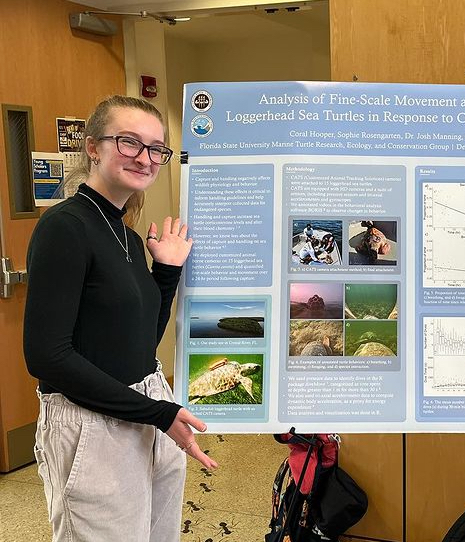Research Symposium
24th annual Undergraduate Research Symposium, April 3, 2024
Coral Hooper Poster Session 4: 2:45 pm - 3:45 pm/18

BIO
My name is Coral Hooper, and I am a third year undergraduate student working with Dr. Mariana Fuentes, Dr. Joshua Manning, and Sophie Rosengarten on researching the effects of capture and handling stress on sea turtles. I am on a pre-veterinary track, and I have a passion for helping and learning all I can about animals.
Capture and Handling Causes Short-Term Effects on the Movement and Behavior of Loggerhead Sea Turtles (Caretta caretta)
Authors: Coral Hooper, Dr. Mariana FuentesStudent Major: Biological Sciences
Mentor: Dr. Mariana Fuentes
Mentor's Department: EOAS Mentor's College: Arts and Sciences Co-Presenters: Sophie Rosengarten
Abstract
Wildlife capture and handling is often necessary to achieve research goals but can negatively affect animal physiology and behavior. Understanding the implications of these effects for endangered species is critical to inform handling protocols and for accurate data interpretation. Sea turtles are charismatic, threatened species . As such, sea turtle research is conducted globally to collect biological and ecological data. Sea turtles do not lend themselves well to observational work, often requiring capture and handling. Capture and handling are known to increase corticosterone levels and cause changes in sea turtle blood chemistry. In contrast, we know relatively little about how they affect sea turtle behavior post-release. To address this question, we deployed specialized CATS (Customized Animal Tracking Solutions) cameras on 15 loggerhead sea turtles (Caretta caretta) to investigate fine-scale movement and behavior 24-hrs post-release. Our CATS cameras record HD video of sea turtle behavior and contain several sensors that allow for analysis of fine-scale movement and diving. We annotated videos from each deployment to quantify behavior (e.g., swimming, foraging, resting) in the behavioral analysis software BORIS, and analyzed changes in these behaviors in R. These analyses were paired with analyses of movement and dive data to better understand the short-term effects of capture and handling on sea turtles. Our preliminary data suggest that turtles swim more often, dive more frequently and for longer, and rest/forage less often immediately following release, resulting in increased energy expenditure. These effects diminished quickly, and our findings suggested normal behavior resumed after approximately 160 minutes.
Keywords: Sea turtle, handling stress, Caretta caretta


